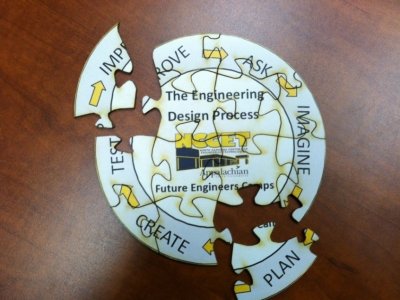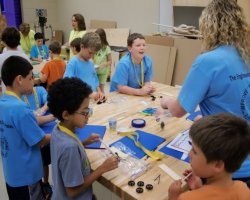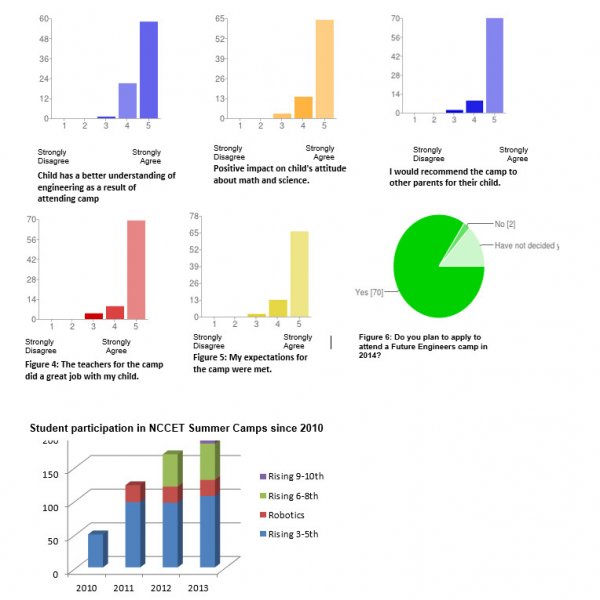
2013 Future Engineers Camp Pictures
Robotics Camp and Product Development Camp - June 17th - June 21st
Middle School Future Engineer Camp - June 24th - June 28th
Future Engineer Camp - July 8th - July 12th
Future Engineer Camp - July 15th - July 19th
2013 Future Engineers' Camp Summary!
Putting the pieces together for the Engineering Design Process, the North Carolina Center for Engineering Technologies (NCCET) in collaboration with Catawba Valley Community College (CVCC) and NCSU completed five future engineers' camps in the summer of 2013. 193 students ranging from rising 3rd graders to rising 10th graders were engaged in the engineering process and completed activities to better understand the math, science and technology involved in various engineering disciplines (STEM).
Students were engaged in activities related to multiple disciplines in engineering including chemical engineering, structural engineering, mechanical engineering, civil engineering and electrical engineering. In addition, rising 3rd through 8th graders were able to construct and program autonomous robots to complete a task related to the recently identified "Grand Challenges of Engineering."
This was the fourth year of camps at the NCCET and the responses from the students and the parents have been outstanding (49% response rate for 2013). When asked on a follow-up survey if their child will apply for camps next year, 83% indicated yes and 14% indicated they hadn't decided yet. The surveys were replete with comments like: "You all ran a phenomenal camp and we hope that our son will be able to attend next year as well. As an engineer in the current job market, I was thoroughly impressed with how the staff taught concepts that I deal with on a daily basis such as time management, cost effectiveness, and teamwork. I think it is fantastic that you all are able to offer these camps so that children can have a good idea of what the field of engineering entails. Thank you for providing a wonderful experience for our son! Only wish this was available when I was a kid!""_____ had an amazing time at camp. It seems like you had a perfect combination of learning and ʺfunʺ (which is exactly what science is supposed to be!). We couldn't be happier, and couldn't be more thankful for the scholarship."
"Nice presentations on Friday. Very impressive facility and staff. It was great to hear the kids analyzing problems as they tested their robots - it showed that they understood the programming, and were experiencing real engineering without a lecture!"
"This was the best money spent for my son! He enjoyed everyday and was excited to see what was next. He came home and started building his robot with Legos! Thank you for your enthusiasm toward reaching kids early!"
"Both my daughters talked endlessly about the camp, recreated experiments at home, and shared their excitement with everyone that would listen (and a few that didn't really want to listen LOL). Both girls wished the camp was all summer, that school was like camp, and informed me that they WOULD be returning next summer!!"
"My child enjoyed the experience he was offered and is looking forward to applying for next year's camp. I have never heard my child talk as much as he did when I would pick him up every afternoon. I enjoyed listening to him describe what he had experienced and how he had learned about this process or that."
"It was really interesting! Learning that failure is good was a different idea. This was a hard thing to ʺgrappleʺ with since success is stressed in school. Also, the EXPLANATIONS were good and being able to ask questions and discuss solutions. So often kids do projects but the science part is not explained. Our son came home and discussed the science behind what he experienced and wanted to try other experiments and projects beyond the camp experience."
"He is still talking about the camp weeks later! He is noticing architectural structures everywhere we go and explaining to us how engineers built them. Also, he has researched the Internet for universities offering engineering degrees (he is only in 5th grade), He has already written his essay to apply for next year's camp. I have never seen my child so excited about participating in any activity or so ʺin his elementʺ. He says it was the coolest thing he has ever done."
"The Lego Mindstorms were a huge hit for both boys. Nao was really cool for them to see. Also, they both enjoyed the marshmellow bridge and car crash. I love that it was explained to them what type of engineer would be utilized in each activity."
In addition to the comments the surveys also indicated positive feelings about the camps. The responders were given a 1 – 5 response scale, with 5 being the highest.
Parent comments continued to be very favorable regarding the camps. One parent stated that "My child is socially awkward at school, but was a shining star at camp. "
The fourth year of camps has been another overwhelming success. The number of camps offered and the number of students in the Future Engineers camps has increased each year. The following chart shows the progression of student involvement over the four year period of camp delivery. As one can see from the chart, the enrollment has risen from 49 in the first year to 193 in the fourth year.
In addition to the students, the Future Engineers Camps have had a significant influence on the teachers and teacher assistants hired and trained to deliver the activities in the camps. Their experience allowed them to learn about engineering concepts and the engineering process. This experience and knowledge of the specific activities inspired many of the teachers.
The Future Engineers Camp teachers were surveyed after the camps completed and 12 of 17 (>70%) completed survey. The overall ratings of the survey were very high. There was not quantifiable data provided to report in graph form, but the teacher comments included numerous statements about the activities in general, the training they received and how they would describe the experience to one of their colleagues.
Most of the teachers (92%) indicated the training was appropriate and made them feel prepared for the camp. The responses to overall Future Engineers Camp Activities were positive as well. There were suggestions including adding the type of engineering related to the activity in the written activity sheet, be more structured in time between presentation and activity, and use a universal "signal" to get kids attention.
In response to the questions "If one of your coworkers asked about your experience, how would you describe it? What did you gain by participating?" the teachers wrote a lot of very positive comments. Since inception of the camps four years ago, it has become apparent that an unintended outcome of the camps is the transformation of the teachers involved. We realized early on that the sustaining outcome of the camp probably lies more with the teachers and how the experience has changed their attitude toward teaching and given them the skills to teach contextually many of the core competencies. Below are excerpts from some of the many comments in this section of the survey:
"Camp is an amazing week to return to what we all entered the teaching profession for. We have the chance to truly see students' minds at work problem solving and remitting prior ideas. Camp gives me lots of new ideas to try in class and especially with our robotics team."
"I would tell them that the experience increased my awareness of the world of engineering, helped me to be a better science teacher and to teach problem solving in a better way. The camp allows kids to fail in a safe way and that it is good for them."
"I have shared with several people I worked with about the camp. It was a great experience for me. I realized that the students in my county didn't have the same opportunities as students in other counties. I came back from camp excited about the upcoming new year and discussed with my principal about the LEGO Mindstorms and how the students were so involved and excited about them. Together, we have come up with an after school program form 3rd grade to slowly introduce the Mindstorms to our students. From camp, it renewed my excitement about STEM education. I was thinking about entering a Master's program which is Curriculum and Instruction with an emphasis in STEM and after camp I decided that I wanted to do this Master's program because STEM education is important. My students deserve those opportunities."
"It was an excellent experience for myself as a teacher. I feel I learned a lot about teaching engineering because it is different from teaching anything else. I would recommend that they apply for a position."
"I would recommend this experience to any teacher who wants to add to their ʺteacher toolkitʺ by encouraging them to apply for these camps. I have learned so much about engineering and STEM! Our students need to know about this vital field and how it impacts their everyday life. I can't wait to inspire my students to consider this field for their future careers by doing some of the camp activities with them. The Engineering Design Process applies to everything we do in public schools and I want to share that with my classes."
"Camp is more than a ʺregular summer camp.ʺ The students at camp are taught to THINK and engage with all activities on many different levels. Students are constantly moving, thinking, manipulating, asking questions, thinking about the process to solve a problem, and SOLVING a problem with higher order thinking. Common Core would be so impressed! :) I wish more schools and teachers would ʺteach and facilitateʺ like this camp, to ensure that students think about topics and problems to solve."
"I have already told many of my co-workers about the great time we had and how excited I am about using some of the activities in the classroom. I explained how we need to focus on the engineering concept more and give students more chances to think on their own and even fail sometimes. It definitely pumped me up and got me excited about teaching science again this year."
"I would begin by explaining how much fun engineering is and how this camp has taught me how to include the engineering process and stem learning into my classroom lessons. I would share the different activities we did at camp and discuss with them how to incorporate them into the classroom and the benefits of students completing these types of activities and learning about engineering!"
"Camp is a great opportunity to learn better ways to engage students in STEM. It is also a valuable learning experience for teachers to encourage experimentation and failure for students who are used to getting things ʺrightʺ."
"I have shared this experience with many co-workers already. I explained this is what teaching is about..watching students make discoveries and coming to conclusions with little direct instruction. Allowing them freedom to explore and learn together made me realize this type learning can take place in all subjects. I tell them science and math can be incorporated in daily teaching, not just a few short weeks. Having students apply what they learned in camp to real-life situations is memorable and most of FUN! I gained a brand new approach to how I will teach this year to incorporate group work, teamwork, and communication. Most of all...the idea that failure IS an option, it is what we learn from our failures that lead to success!"
The camps continue to be a success and are addressing a critical need (STEM) at a critical age. Students typically lose their interest in science and math between elementary and middle school ages. An intended outcome is that the principles and the processes taught in these camps will keep the students interested in science and math and allow them to pursue careers in STEM. A follow-up study is planned for 2017 to determine what post high school education, training and jobs the campers in the 2010 camps are pursuing. The study will compare that group to the "norm" and see if we can draw inferences from the impact of the future engineers' camps on these student's career decisions.
The North Carolina Center for Engineering Technologies was established in 2008 as a Center of Appalachian State University. The mission of the NCCET is to provide access to university degree programs in engineering and related disciplines for an area of the state that does not have the presence of a four year public university. Seeking the needs of the region and assessing the preparedness of the potential students revealed there was a lack of qualified students with sufficient math and science skills to enter engineering programs. To address this problem the NCCET director sought a method to improve the math and science interests of students in the public schools so that they will be more likely to pursue careers in science, technology, engineering and math (STEM). Partnering the NC State University's College of Engineering and the local community college, summer week-long day camps began in June 2010.


